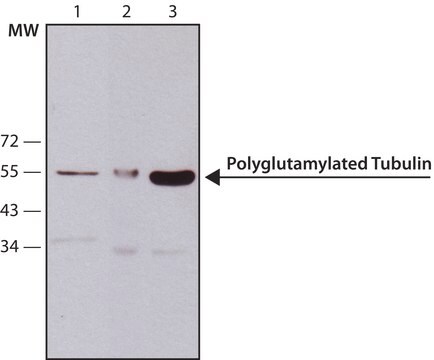AB15348
Anti-FMRFamide Antibody
serum, Chemicon®
Synonyma:
Anti-Anti-FMRFAL
Přihlásitk zobrazení cen stanovených pro organizaci a smluvních cen
About This Item
UNSPSC Code:
12352203
eCl@ss:
32160702
NACRES:
NA.41
Doporučené produkty
biological source
rabbit
Quality Level
antibody form
serum
antibody product type
primary antibodies
clone
polyclonal
species reactivity
rat
manufacturer/tradename
Chemicon®
technique(s)
immunohistochemistry: suitable
NCBI accession no.
UniProt accession no.
shipped in
dry ice
target post-translational modification
unmodified
Související kategorie
Immunogen
FMRFamide
Application
Anti-FMRFamide Antibody is an antibody against FMRFamide for use in IH.
Immunohistochemistry: 1:1,000 - 1:5,000
Application Notes for Immunohistochemistry:
- Suggested perfusion steps:
1) Ca2+-free Tyrode′s solution
2) Paraformaldehyde-picric acid fixative
3) 10% sucrose in PBS as a cryo-protectant
- Rapidly dissect tissue and store overnight in 0.1 M phosphate buffer (pH 7.4) containing 10% sucrose.
- Incubate slide-mounted tissue sections with blocking buffer for 1 hour at room temperature.
- Remove blocking buffer and incubate the slides with the primary antibody (AB15348 diluted to desired working concentration in blocking buffer) for 18-24 hours at 2-8°C.
- Remove primary antibody and rinse 3 times in PBS.
- Incubate sections with fluorescently labeled secondary antibody for 60 minutes at room temperature.
Optimal working dilutions must be determined by the end user.
Application Notes for Immunohistochemistry:
- Suggested perfusion steps:
1) Ca2+-free Tyrode′s solution
2) Paraformaldehyde-picric acid fixative
3) 10% sucrose in PBS as a cryo-protectant
- Rapidly dissect tissue and store overnight in 0.1 M phosphate buffer (pH 7.4) containing 10% sucrose.
- Incubate slide-mounted tissue sections with blocking buffer for 1 hour at room temperature.
- Remove blocking buffer and incubate the slides with the primary antibody (AB15348 diluted to desired working concentration in blocking buffer) for 18-24 hours at 2-8°C.
- Remove primary antibody and rinse 3 times in PBS.
- Incubate sections with fluorescently labeled secondary antibody for 60 minutes at room temperature.
Optimal working dilutions must be determined by the end user.
Research Category
Neuroscience
Neuroscience
Research Sub Category
Hormones & Receptors
Hormones & Receptors
Physical form
Liquid with 0.05% sodium azide.
Serum
Storage and Stability
Maintain at -20°C in undiluted aliquots for up to 6 months after date of receipt. Avoid repeated freeze/thaw cycles.
Legal Information
CHEMICON is a registered trademark of Merck KGaA, Darmstadt, Germany
Disclaimer
Unless otherwise stated in our catalog or other company documentation accompanying the product(s), our products are intended for research use only and are not to be used for any other purpose, which includes but is not limited to, unauthorized commercial uses, in vitro diagnostic uses, ex vivo or in vivo therapeutic uses or any type of consumption or application to humans or animals.
Ještě jste nenalezli správný produkt?
Vyzkoušejte náš produkt Nástroj pro výběr produktů.
Storage Class
10 - Combustible liquids
wgk_germany
WGK 1
Osvědčení o analýze (COA)
Vyhledejte osvědčení Osvědčení o analýze (COA) zadáním čísla šarže/dávky těchto produktů. Čísla šarže a dávky lze nalézt na štítku produktu za slovy „Lot“ nebo „Batch“.
Již tento produkt vlastníte?
Dokumenty související s produkty, které jste v minulosti zakoupili, byly za účelem usnadnění shromážděny ve vaší Knihovně dokumentů.
Tigran P Norekian et al.
Frontiers in neuroscience, 17, 1125476-1125476 (2023-06-19)
Cilia are the major effectors in Ctenophores, but very little is known about their transmitter control and integration. Here, we present a simple protocol to monitor and quantify cilia activity and provide evidence for polysynaptic control of cilia coordination in
Nada Abdellah et al.
Anatomical record (Hoboken, N.J. : 2007), 301(6), 1103-1114 (2018-01-19)
Neuropeptides AF (NPAF), FF (NPFF) and SF (NPSF) are RFamide neuropeptides known to be widely expressed in the mammalian central nervous system, where they fulfill a wide range of functions with pain modulation being the most prominent one. Recent evidence
Daniel Kueh et al.
The Journal of comparative neurology, 521(12), 2833-2849 (2013-02-26)
The formation and refinement of synaptic connections are dependent on the activity that emerges from nascent synaptic connections. Such activity has the effect of regulating the production and release of specific neurotransmitters. To determine the role of activity in regulating
Yun Seon Bae et al.
Biology, 9(9) (2020-09-10)
Regeneration is a biological process restoring lost or amputated body parts. The capability of regeneration varies among organisms and the regeneration of the central nervous system (CNS) is limited to specific animals, including the earthworm Perionyx excavatus. Thus, it is
An Inhibitory Circuit From Brainstem to GnRH Neurons in Male Mice: A New Role for the RFRP Receptor.
Stephanie Constantin et al.
Endocrinology, 162(5) (2021-02-11)
RFamide-related peptides (RFRPs, mammalian orthologs of gonadotropin-inhibitory hormone) convey circadian, seasonal, and social cues to the reproductive system. They regulate gonadotropin secretion by modulating gonadotropin-releasing hormone (GnRH) neurons via the RFRP receptor. Mice lacking this receptor are fertile but exhibit
Náš tým vědeckých pracovníků má zkušenosti ve všech oblastech výzkumu, včetně přírodních věd, materiálových věd, chemické syntézy, chromatografie, analytiky a mnoha dalších..
Obraťte se na technický servis.






![CHAPS (3-[(3-Cholamidopropyl)-dimethylammonio]-propane- sulfonate) for biochemistry](/deepweb/assets/sigmaaldrich/product/structures/265/550/452ffcaa-af89-4e31-99a1-0a0f29072b82/640/452ffcaa-af89-4e31-99a1-0a0f29072b82.png)
